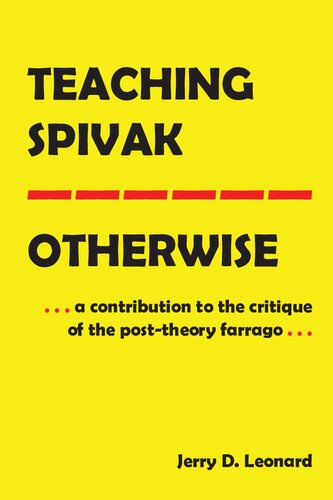

Most ebook files are in PDF format, so you can easily read them using various software such as Foxit Reader or directly on the Google Chrome browser.
Some ebook files are released by publishers in other formats such as .awz, .mobi, .epub, .fb2, etc. You may need to install specific software to read these formats on mobile/PC, such as Calibre.
Please read the tutorial at this link: https://ebookbell.com/faq
We offer FREE conversion to the popular formats you request; however, this may take some time. Therefore, right after payment, please email us, and we will try to provide the service as quickly as possible.
For some exceptional file formats or broken links (if any), please refrain from opening any disputes. Instead, email us first, and we will try to assist within a maximum of 6 hours.
EbookBell Team

4.3
28 reviewsGrounded in the revolutionary Marxist view that "theory … becomes a material force when it has seized the masses," Teaching Spivak―Otherwise: A Contribution to the Critique of the Post-Theory Farrago activates the practice of critique as a mode of "teaching otherwise" for transformative social change. Taking the post-theory teachings of Gayatri Chakravorty Spivak as its central focus, author Jerry D. Leonard meticulously unpacks Spivak’s fashionably dense writings and "talks." His analyses reveal that what passes for "radical" thought in the dominant humanities is actually a sustained mystification that attempts to erase class struggle and class critique from the realm of knowledge. One of the book’s most significant interventions is its powerful appropriation of "close reading" as a strategy in the broader project of ideology critique. Teaching Spivak―Otherwise does for Spivak what Frederick Engels did for Eugen Dühring and Mao Zedong did for Deng Xiaoping: it teaches the class lesson that Spivak’s thought is a complexly obscured articulation of "new" ruling class ideas in what Lenin called "a farrago of contrasting principles …, an urge to rise verbally to the higher spheres and conceal the conflicts between the historical groups of the population with phrases." This book will be a useful supplementary text for undergraduate and graduate courses in contemporary critical theory and pedagogy.